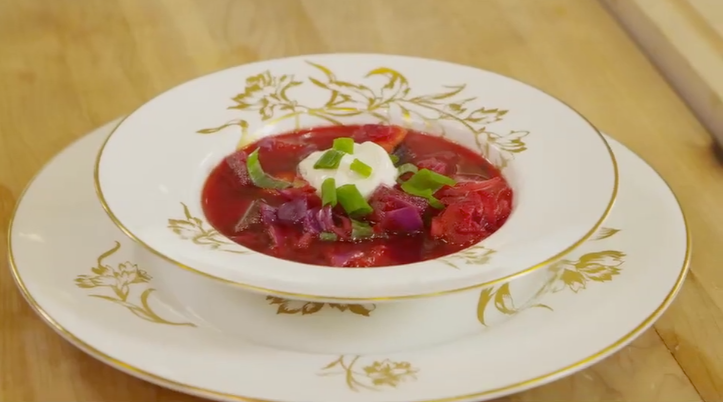The classic Slavic winter soup—delicious, hearty, and colorful. Nearly all borscht served in Russia has beef and makes a meal, but typically in western countries, we make a vegetarian version and serve before the main dish. I’m sharing the vegetarian version here. If you wish to include beef, slice 1 pound grass-fed beef chuck into bite-sized piece, saute with 1 tablespoon of ghee until lightly browned in a skillet, set aside, then add beef to the soup when you add the potatoes and cabbage.
Prep Time: 20 minutes
Simmering Time: 30 minutes
Serves: Six
Ingredients:
4 medium beets
2 Tbsp Avocado oil
1 medium white onion, diced
½ tsp sea salt
½ tsp ground black pepper
½ tsp dried dill
1 tsp caraway seeds
2 medium carrots, ¾-inch cubed
2 medium celery stalks, chopped
2 cups purple potatoes (or baby red-skinned potatoes), cut into bite-sized portions
2 cups red cabbage, coarsely chopped
4 medium garlic cloves, diced
2 cups tomatoes, chopped (or 15 ounces canned, chopped tomatoes)
6 cups low-sodium organic vegetable or beef broth
Garnish:
Optional: 1/2 cup organic low-fat sour cream (or organic plain low-fat yogurt)
¼ cup chives, diced
Directions:
Rinse beets and trim off the roots and tops, peel away the thick or unsightly skin.
Heat a large saucepan to medium-high heat, add oil, then add onion to the pan and sauté with salt, pepper, dill, caraway seeds for 2-3 minutes, until slightly yellow to golden. Meanwhile, cut two beets into ¾-inch cubes; grate the other two beets. Add beets to the pan. Next add carrots, celery, potatoes, cabbage, garlic, tomatoes, and broth. Bring to a gentle boil, then reduce heat to simmer for 30 minutes.
Serve in individual bowls and garnish with a dollop of sour cream or yogurt and chives.
Enjoy,
Steven Masley, MD

Hello Dr. Masley, this is a great dish but I have two questions: I struggle to keep my fasting blood sugar below 5 mmol/L. Beets are a healthy food but do raise blood sugar. Are the Russians smarter by adding some protein and probably some fat with that, to slow down the carbohydrate absorption? These traditional recipes are often tried and true. Your comment would be appreciated
Hi Maria,
Beets actually have a very low glycemic load, one serving has a glycemic load of only 4, meaning when you eat one serving (1/2 to 1 cup) your blood sugar levels shouldn’t rise. With glycemic index testing, they give you a load of 50 grams of carbohydrate and check your blood sugar levels afterwards, but you would have to eat 5 cups of beets in one meal to get this amount of carb, which I doubt I could do if you paid me.
Adding protein does lower the glycemic load, but only by about 10%, so not a big difference. If you have pre-diabetes (insulin resistance), I think more critical is to avoid eating potatoes, and traditional borscht is made with potatoes, so I’d suggest avoiding them.
There was a recent study that shows that eating more root vegetables (such as carrots, beets and turnips but excluding potatoes) decreases your risk for developing diabetes. (Cooper. Eur J Clin Nutr 2012;66:1082-92).
I still feel that as eating beets improves circulation and improves blood pressure control, they are some of the healthiest foods we can eat.
I hope this answers your question.
Steven Masley, MD
Many thanks, Dr Masley, This looks like the perfect dish for a chilly evening – we’re not quite out of winter here in the UK!
A hot bowl of borscht is great on a cold night, but I like to serve chilled borcht in the summer as well.
Bon Appetit!
Steven Masley, MD
Thank you for this timely post, as I happen to have all the ingredients except the dill seed but, I shall replace it with fennel seed.
It’s a chilly March day here in France so a good ‘hearty’ soup will be just the thing we need.
Your work and your site is a real blessing. Thank you.
The Ukrainian meaty borscht is absolutely divine.
On the subject of vegetarian borscht. You could try substituting sauerkraut or cabbage for potatoes. Borscht can also have stewed tomatoes if you like a tart taste.